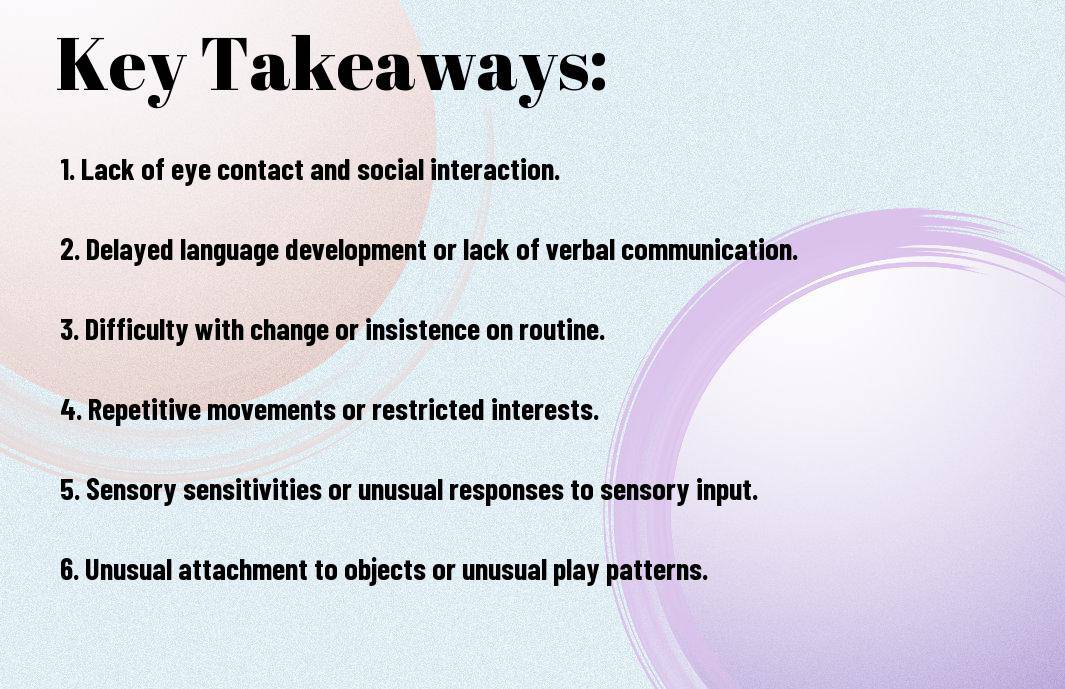Autism, a complex developmental condition, can manifest in early childhood, but its signs are not always easily recognizable. Research shows that early intervention can have a significant impact on the long-term development of children with autism. It is crucial for parents and caregivers to be aware of the early signs so that appropriate support and interventions can be put in place. In this blog post, we will discuss the key indicators of autism in toddlers, including social, communication, and behavioural cues that may point to the condition. Understanding these signs can enable early detection and timely intervention to support the child’s overall development.
Key Takeaways:
- Delayed Speech Development: One of the early signs of autism in toddlers is a delay in speech development. Look for a lack of babbling or limited use of words by the age of 18 months.
- Repetitive Behaviours: Another key sign to look for is repetitive behaviours, such as flapping hands, rocking, or fixating on specific objects or topics.
- Social Interaction Difficulties: Toddlers with autism may also struggle with social interaction, such as making eye contact, responding to their name, or showing little interest in playing with others.

Recognizing Early Behavioral Signs
Lack of Social Interaction
Toddlers with autism may show a lack of interest in interacting with others. They may not respond to their name being called, avoid making eye contact, and seem disinterested in playing with other children.
Additionally, they may not engage in simple games like peek-a-boo or patty cake, and may not show the typical interest in sharing experiences with their caregivers.
Limited Nonverbal Communication Skills
Children with autism may have difficulty with nonverbal communication, such as gestures and facial expressions. They may not point to objects or show them to others, and may not use gestures like waving or nodding.
Furthermore, they may struggle with understanding and using facial expressions and other nonverbal cues during interactions, making it challenging for them to express their needs and emotions.
In some cases, toddlers with autism may not develop speech at the typical age, or they may lose previously acquired language skills, which can be a cause for concern.

Early Speech and Language Difficulties
One of the early signs of autism in toddlers is speech and language difficulties. These can manifest in various ways and may indicate the need for further evaluation and support.
Delayed Speech Development
Toddlers with autism may exhibit delayed speech development, such as not babbling by 12 months, not speaking single words by 16 months, or not using simple phrases by 24 months. This can be a red flag for potential autism spectrum disorder and should be taken seriously by parents and caregivers. Early intervention is crucial in helping these children overcome communication challenges and improve their overall development.
Repetitive or Atypical Language Use
Another indication of autism in toddlers is repetitive or atypical language use. This can include echolalia (repeating words or phrases), speaking in a robotic or sing-song voice, or using unusual phrases. Parents should be mindful of these symptoms and seek professional advice if they observe such behaviour in their child.
It’s important to note that not all toddlers with speech and language difficulties have autism, but these signs should not be ignored. Seeking an early assessment and intervention can make a significant positive impact on a child’s development.

Behavioural and Sensory Indications
Unusual Play Patterns
One early sign of autism in toddlers is the display of unusual play patterns. This could manifest in a few different ways, such as a lack of interest in playing with toys, repetitive and obsessive play, or a preference for solitary play rather than engaging with other children. It is important to note that every child is unique and may have different preferences when it comes to play, but if you notice consistent and extreme patterns of unusual play behaviour, it may be worth discussing with a healthcare professional.
Heightened or Reduced Sensory Response
Another important behavioural and sensory indication to look out for is a heightened or reduced sensory response. This refers to how a toddler reacts to sensory stimuli such as bright lights, loud noises, or certain textures. A child with autism may display an extremely heightened response, such as covering their ears and becoming distressed in noisy environments, or they may have a reduced response, such as not reacting to pain or extreme temperatures in the same way as other children. These extreme sensory responses can greatly impact a toddler’s ability to function in different environments and can provide valuable insight into their sensory processing.
It is important to remember that not all children with autism will display the same behavioural and sensory indications, and some may exhibit certain signs more prominently than others. If you have any concerns about your child’s behavioural or sensory responses, it is always best to seek advice from a qualified healthcare professional.
Practical Steps for Parents and Caregivers
Monitoring Developmental Milestones
It is crucial for parents and caregivers to regularly monitor the developmental milestones of their toddlers. Keep a close eye on their communication skills, social interactions, and repetitive behaviours. If you notice any delays or unusual patterns in their development, it is essential to seek professional advice promptly.
When and How to Seek Professional Advice
If you have concerns about your toddler’s development, do not hesitate to consult with a healthcare professional as early as possible. Look out for red flags such as a lack of eye contact, delayed speech, or sensory sensitivities. Book an appointment with a paediatrician or a developmental specialist to discuss your observations and seek expert guidance.
Remember that early intervention is key in supporting your child’s development if there are any concerns about autism. The sooner you seek help, the sooner your child can receive the support they need.
Early Signs of Autism in Toddlers – What to Look For
It is crucial for parents and caregivers to be aware of the early signs of autism in toddlers, as early intervention can greatly benefit children with autism. Some common signs to look out for include difficulty with social interaction, delayed speech or communication skills, repetitive behaviours, and sensitivity to sensory stimulation. It is important to note that every child is unique, and not all children with autism will display the same signs. If you have concerns about your child’s development, it is advisable to seek professional advice and evaluation. For more information on early signs of autism in toddlers, visit Autism Awareness Australia.
FAQ
Q: What are the early signs of Autism in toddlers?
A: Some early signs of Autism in toddlers include delayed speech, lack of eye contact, repetitive movements, and difficulty in social interaction.
Q: At what age should I start looking for signs of Autism in my toddler?
A: Signs of Autism can be observed as early as 18 months of age. It is recommended to be vigilant and look for signs of Autism in toddlers from this age onwards.
Q: What are some red flags that may indicate Autism in toddlers?
A: Red flags that may indicate Autism in toddlers include a lack of response to their name, delayed language development, aversion to physical touch, and fixation on objects or repetitive behaviours.
Q: How can I differentiate between normal toddler behaviour and signs of Autism?
A: It is important to observe the frequency and persistence of certain behaviours. While occasional tantrums and shyness are normal in toddlers, persistent communication difficulties, social withdrawal, and repetitive behaviours may indicate signs of Autism.
Q: Can early intervention improve outcomes for toddlers with Autism?
A: Yes, early intervention programs such as speech therapy, occupational therapy, and behavioural interventions can significantly improve outcomes for toddlers with Autism. Early identification and intervention are crucial for better developmental progress.
Q: What should I do if I suspect that my toddler may have Autism?
A: If you suspect that your toddler may have Autism, it is important to consult a paediatrician or a child development specialist for a comprehensive evaluation. Early diagnosis and intervention can make a significant difference in the child’s developmental progress.
Q: What support is available for families of toddlers with Autism?
A: There are various support services available for families of toddlers with Autism, including parent support groups, early intervention programmes, and access to educational resources. It is important for families to seek support and information to better understand and care for their child with Autism.







